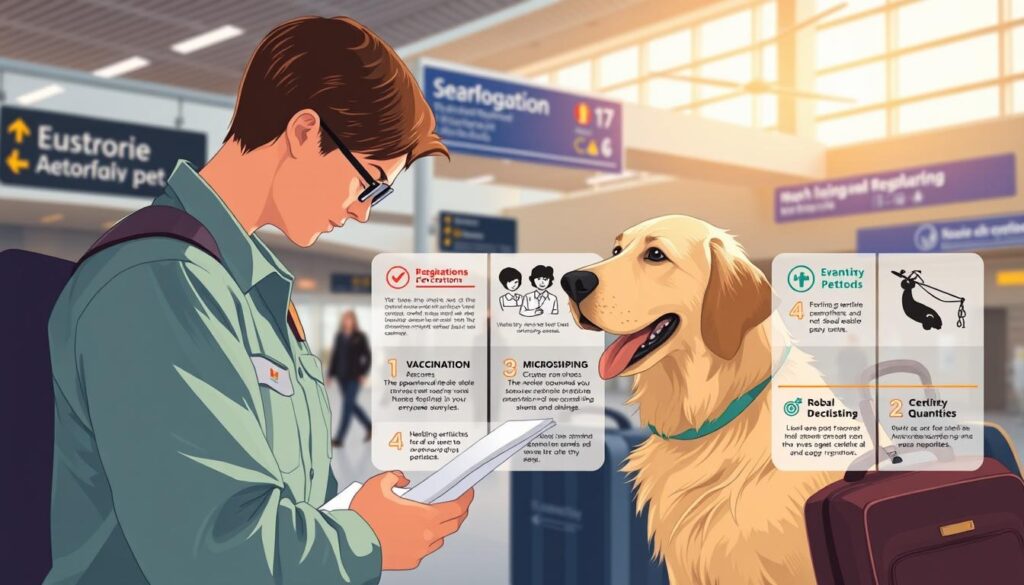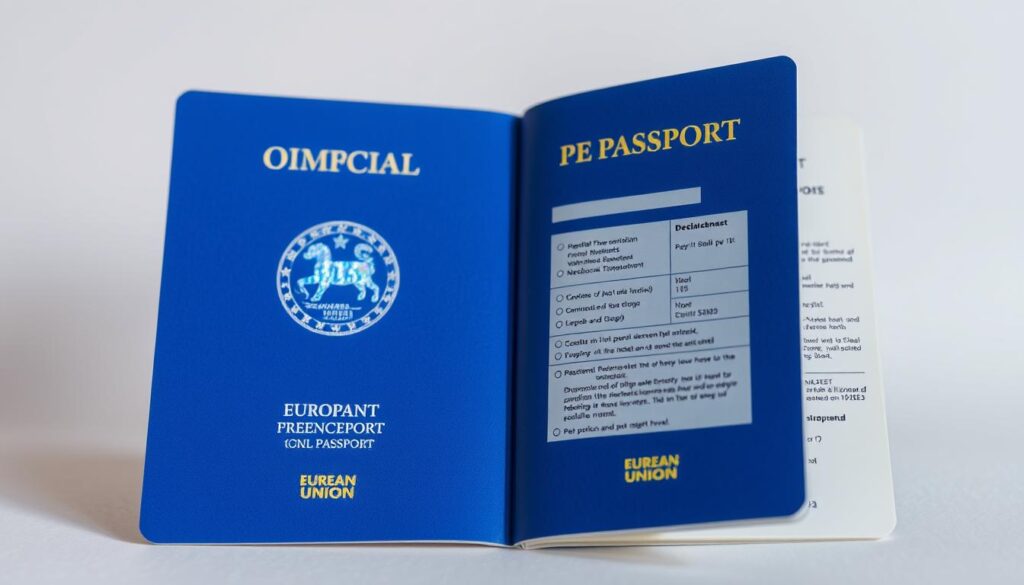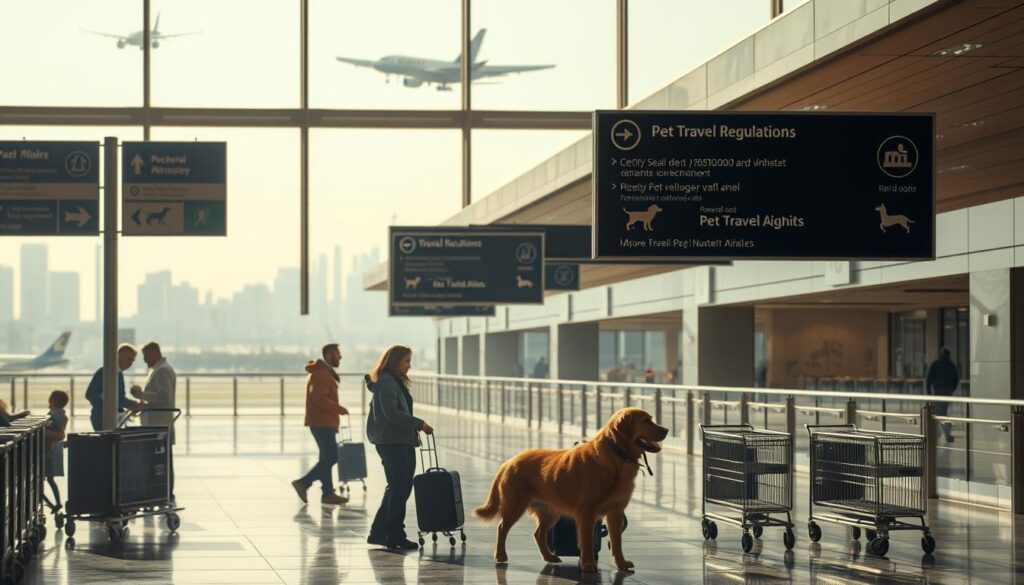More people are traveling with their pets as the world gets smaller. But, dealing with international pet travel rules can be tough. This is because different countries have their own ways of handling pets.
Traveling with pets means facing a lot of rules that change from place to place. It’s hard to plan a trip without knowing these cultural nuances. Knowing them can make your trip much easier.
Key Takeaways
- Researching destination country’s pet import regulations is crucial.
- Understanding cultural attitudes towards pets varies globally.
- Health certificates and vaccinations are universally required.
- Microchipping pets is often mandatory for international travel.
- Quarantine requirements differ significantly across countries.
The Global Landscape of Pet Travel
More people are traveling with their pets now. It’s important to know the pet travel rules around the world. This change comes from seeing pets as family, not just animals.

The Rising Trend of Traveling with Pets
Traveling with pets is becoming more popular. This is because pets are seen as part of the family. Now, there are more places and services for pet-friendly travel.
Pet owners don’t want to leave their pets behind anymore. This isn’t just about convenience. It shows a big change in how we see our pets.
Why Rules Differ Across Countries and Cultures
Even though more people travel with pets, rules vary a lot from country to country. These differences come from how people view pets, health concerns, and biosecurity. For example, some places have strict rules to stop diseases like rabies.
Culture also affects pet travel rules. In some places, pets are part of the family and welcome everywhere. In others, they are seen as working animals or pests.
North American Pet Travel Regulations
Traveling with pets in North America means knowing the rules in the U.S., Canada, and Mexico. While there are some similarities, each country has its own rules. Pet owners need to know these to have a smooth trip.
United States Interstate Travel Requirements
In the U.S., traveling with pets is pretty easy. Pets can go across state lines without much paperwork. They just need to be up-to-date on shots and have a health certificate from a vet within 10 days.
But, it’s important to check the rules of each state. Some states might need extra shots or permits for certain pets.
Canadian Border Crossing with Pets
Going into Canada with pets means following their rules. You need an import permit and to make sure your pet is microchipped and vaccinated against rabies. The Canadian Food Inspection Agency (CFIA) also wants a health certificate within 10 days of arriving.
Some dog breeds might face extra checks or not be allowed at all.
Mexico’s Pet Entry Policies and Cultural Considerations
Mexico has its own rules for pets, like a health certificate and rabies shots. The certificate must be from within 15 days of arriving. You also need an import permit.
Mexico views pets as part of the family. This can affect how pets are treated when traveling.

Knowing these rules and cultural differences is key for a stress-free trip with your pet in North America.
European Union Pet Passport System
The EU Pet Passport system has changed how pets travel in Europe. It lets pet owners explore new places with their pets by their side.
The EU Pet Passport is a document that lets pets travel freely in EU countries. Pets must meet health and ID requirements to use it. This makes traveling with pets easier, without long quarantines in most places.
Simplifying Pet Travel
The EU Pet Passport combines health certificates and vaccination records into one. This makes traveling simpler and ensures pets are healthy and identified.

Country-Specific Requirements
Even with the EU Pet Passport, each country has its own rules. Here are some examples:
| Country | Additional Requirements | Microchip Requirement |
|---|---|---|
| France | Rabies vaccination within 21 days | ISO 11784/11785 compliant |
| Germany | Health certificate within 10 days | ISO 11784/11785 compliant |
| Italy | No additional requirements | ISO 11784/11785 compliant |
Pets in Public Spaces
Cultural attitudes toward pets vary significantly across Europe. For example, in Sweden, pets are welcome almost everywhere. But in other countries, pets might not be allowed in public places.
Knowing these differences is key for a good trip with your pet. By understanding local customs and rules, you can make sure your pet enjoys the trip as much as you do.
Asia-Pacific Region: Strict Quarantine Countries
Pet owners traveling to the Asia-Pacific region face strict rules. These rules are in place to protect against rabies and other diseases. Countries here have some of the toughest regulations in the world.

Japan’s Pet Import Procedures and Cultural Context
Japan has strict rules for pet imports. This includes microchipping and vaccinations. It’s important to understand these rules for a smooth entry. Japan sees pets as family members but has strict rules to keep it rabies-free.
Australia and New Zealand’s Biosecurity Measures
Australia and New Zealand have very strict biosecurity. Pets coming in must go through thorough quarantine. Here’s a quick guide to what you need:
| Country | Quarantine Period | Microchip Requirement |
|---|---|---|
| Australia | 10 days to 30 days | Yes, ISO-compliant |
| New Zealand | Minimum 10 days | Yes, ISO-compliant |
Southeast Asian Nations’ Varying Requirements
Southeast Asia has different rules for pet imports. For example, Thailand needs a rabies vaccine certificate. Vietnam has its own health requirements. It’s key to research each country’s rules for pet travel.
Middle East and African Pet Travel Considerations
Traveling with pets to the Middle East and Africa needs a deep understanding. The region’s cultural and religious views on pets are complex. This complexity can greatly affect your journey, so it’s key to be well-prepared.

Religious and Cultural Influences on Pet Regulations
In the Middle East and Africa, religion and culture deeply shape how people view animals. In many Middle Eastern countries, Islamic beliefs guide pet rules. Some breeds or animals are seen more favorably than others because of these beliefs.
Key cultural considerations include:
- Understanding local attitudes toward pets, which can vary significantly from one country to another.
- Recognizing the role of religion in shaping pet travel regulations.
- Awareness of specific customs or practices that may affect pet owners.
Country-Specific Rules in Major Destinations
Many countries in the Middle East and Africa have their own pet rules. For example:
- United Arab Emirates: Requires an import permit and health certificate for pets.
- South Africa: Mandates a permit from the Department of Agriculture, Land Reform and Rural Development, along with specific vaccinations.
- Morocco: Requires a health certificate and possibly a permit, with specific requirements for dogs, cats, and birds.
Pet owners must research their destination’s specific rules. This ensures they follow local regulations and have a smooth trip.
Cultural Differences in Pet Travel Rules Worldwide: A Deeper Look
Cultural differences shape pet travel rules around the world. How we see and treat pets changes from culture to culture. This affects the rules for traveling with pets.
How Cultural Attitudes Toward Animals Shape Regulations
Cultural views on animals greatly influence pet travel rules. In some places, pets are family members. In others, they are seen differently. For example, in Western cultures, pets are often well cared for and travel with their owners.
This acceptance leads to more relaxed pet travel rules. On the other hand, places where pets are not part of the family have stricter rules.
Examples of cultural influences on pet travel include:
- In some European countries, pets are allowed in public spaces and restaurants, showing a welcoming culture.
- Other countries have strict quarantine laws due to animal health concerns and cultural history.
Religious Perspectives Influencing Pet Travel Policies
Religion also shapes pet travel policies. For instance, in countries with strong Islamic traditions, dogs are viewed differently than in Western cultures. This affects rules on importing and traveling with dogs. It’s important for pet owners to know these religious views when traveling with pets.
Key religious influences include:
- In some Muslim countries, dog regulations are stricter due to religious beliefs.
- Animal treatment and travel can be affected by religious festivals or practices.
Urban vs. Rural Differences in Pet Acceptance
Pet acceptance varies between cities and rural areas. Cities often have more pet-friendly places and accept pets in public. Rural areas have different attitudes and fewer pet amenities. This difference affects local pet travel rules.
Pet owners should check the local culture and rules at both their starting and ending points. This ensures a safe and enjoyable trip for their pets.
Service Animals vs. Pets: Different Rules Globally
As the world opens up, it’s key to know the rules for service animals worldwide. These animals help people with disabilities. But, how they are seen and treated varies from country to country.
International Recognition of Service Animal Status
Not all places see service animals the same way. In the U.S., the Americans with Disabilities Act (ADA) clearly defines them. But, other countries have their own rules and views.
“The key to smooth international travel with service animals lies in understanding the destination country’s laws and regulations regarding service animals.” You need to know about health certificates and vaccination proof. Also, be aware of any special rules for service animals in public and hotels.
Cultural Variations in Service Animal Acceptance
How people see animals can change how they view service animals. In some places, dogs are seen as unclean. This can make it hard for service dogs to be accepted.
In Western countries, laws protect the rights of service animals. Knowing these cultural differences helps travelers with service animals move around smoothly and with respect.
Being aware of these differences can make a significant difference in the success of international travel with service animals.
Health Documentation and Vaccination Requirements
To travel internationally with your pet, you must follow health rules and vaccination needs. It’s key to have all the right health papers ready for a smooth trip.
Universal Health Certificate Requirements
Most countries need a health certificate for pets coming in. This is given by a vet and shows your pet is healthy and vaccinated. The International Health Certificate, or Export Health Certificate, is good for a few weeks to months, based on where you’re going.
Rabies-Free Countries vs. Endemic Regions
The rabies status of your destination affects your pet’s vaccination needs. Places without rabies might have easier rules. But, going to areas with rabies means strict vaccination rules, often needing a rabies shot not too long before you leave.
Timing Your Veterinary Visits for International Travel
When to see the vet is very important for traveling with pets. You should book a vet visit early to make sure your pet gets all shots and checks. Some shots need time to work, and countries have rules about when these can be given.
Knowing and following these health and vaccination rules helps make traveling with pets easy and worry-free.
Navigating Pet-Friendly Accommodations Worldwide
Finding pet-friendly places to stay is key to a stress-free trip with your pet. As more pet owners travel with their pets, knowing about pet-friendly spots worldwide is vital.
Cultural Differences in Hotel Pet Policies
Hotel pet policies differ a lot around the world. For example, some hotels in Japan might only allow small pets. On the other hand, some fancy hotels in Europe offer special pet services. Knowing these differences helps pet owners pick the best places to stay.
- In the United States, many hotels welcome pets.
- But, some countries in the Middle East have stricter pet rules in hotels.
- European hotels often have pet-friendly services, but rules can change a lot.
Alternative Lodging Options for Pet Travelers
There are many other places to stay that are pet-friendly. You can find vacation rentals, pet-friendly resorts, and even campsites. Pet owners can find places that meet their pets’ needs.
“The rise of pet-friendly vacation rentals has made traveling with pets much easier, offering more space and flexibility for pet owners.” – Pet Travel Expert
Researching Local Pet Etiquette Before Travel
It’s important to learn about local pet rules before you go. Different places have different views on pets. For instance, in some places, pets can’t go in public areas, while in others, they’re welcome.
By learning about pet rules in hotels, exploring other places to stay, and researching local pet rules, pet owners can have a great trip. They’ll make sure their pets are happy and comfortable too.
Conclusion: Preparing for a Smooth International Journey with Your Pet
Traveling with pets internationally means knowing many rules and cultural views. We’ve looked at how cultural differences in pet travel rules worldwide affect international pet travel. By learning about your destination’s needs, you can make your journey smooth for both you and your pet.
Before you go, check the rules for your destination. This includes health papers, vaccination needs, and how locals view pets. Knowing these details helps you deal with the challenges of international pet travel. For example, some places have strict quarantine rules, while others have special rules for service animals.
Being well-informed and ready can reduce stress and make your trip fun for you and your pet. Whether you’re traveling for fun or moving, understanding the rules and cultural differences is key. It will greatly improve your international pet travel experience.







